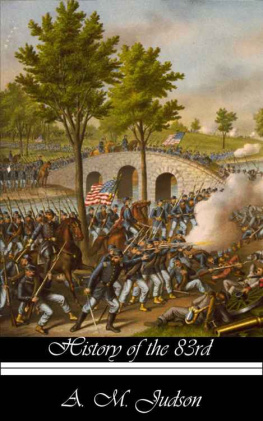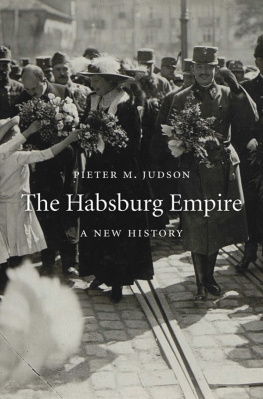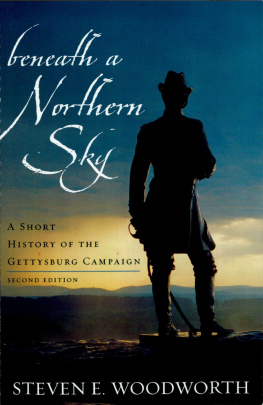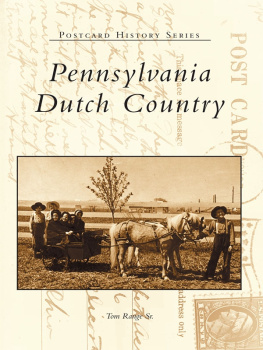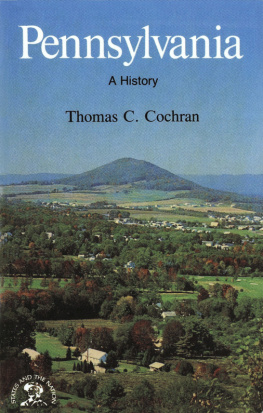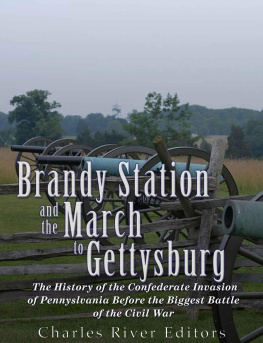Judson - History of the Eighty-third Regiment Pennsylvania Volunteers.
Here you can read online Judson - History of the Eighty-third Regiment Pennsylvania Volunteers. full text of the book (entire story) in english for free. Download pdf and epub, get meaning, cover and reviews about this ebook. year: 2015, genre: Non-fiction. Description of the work, (preface) as well as reviews are available. Best literature library LitArk.com created for fans of good reading and offers a wide selection of genres:
Romance novel
Science fiction
Adventure
Detective
Science
History
Home and family
Prose
Art
Politics
Computer
Non-fiction
Religion
Business
Children
Humor
Choose a favorite category and find really read worthwhile books. Enjoy immersion in the world of imagination, feel the emotions of the characters or learn something new for yourself, make an fascinating discovery.
- Book:History of the Eighty-third Regiment Pennsylvania Volunteers.
- Author:
- Genre:
- Year:2015
- Rating:3 / 5
- Favourites:Add to favourites
- Your mark:
- 60
- 1
- 2
- 3
- 4
- 5
History of the Eighty-third Regiment Pennsylvania Volunteers.: summary, description and annotation
We offer to read an annotation, description, summary or preface (depends on what the author of the book "History of the Eighty-third Regiment Pennsylvania Volunteers." wrote himself). If you haven't found the necessary information about the book — write in the comments, we will try to find it.
Judson: author's other books
Who wrote History of the Eighty-third Regiment Pennsylvania Volunteers.? Find out the surname, the name of the author of the book and a list of all author's works by series.
History of the Eighty-third Regiment Pennsylvania Volunteers. — read online for free the complete book (whole text) full work
Below is the text of the book, divided by pages. System saving the place of the last page read, allows you to conveniently read the book "History of the Eighty-third Regiment Pennsylvania Volunteers." online for free, without having to search again every time where you left off. Put a bookmark, and you can go to the page where you finished reading at any time.
Font size:
Interval:
Bookmark:


Contents
When I first conceived the idea of writing the History of the Eighty-Third, I was at a loss what style of composition to adopt; well knowing that when a man appears before the public in the character of a historian, he should endeavor to please his readers by a proper dignity of style, as well as by a scrupulous adherence to truth in his narrative. With this grand project in view, I began to cast about for a suitable model; and the first person I hit upon was Gibbon, the immortal author of the Decline and Fall of the Roman Empire , which I had left off reading at the four hundred and twenty-fifth page, Fourth Volume, when the war broke out, and which I have never returned to since. With Gibbon in my eye, I sat down to pen a pompous opening: but after floundering about for a whole hour, making as many flourishes as a country writing-master, and conceiving a thousand splendid ideas without giving birth to a single one of them, I all at once came to, and said to myself, What's the use? I am not writing the Decline and Fall of the American Empire , and hope never to have that opportunity. Nor am I writing the history of the Rebellion, nor the history of the Army, nor even of a corps, division, or brigade; but simply the history of a single regimenta history which will be read only in a small portion of this great country, and by the survivors only of that regiment and their immediate friends and relatives. All they care for is the simple truth, and I can give it to them in plain language and in my own style. In one moment after coming to this sensible conclusion, I plumed my wings for a fresh effort, and, with that buoyancy which he alone feels who dips his pen in the inkstand of his own heart, I rushed into my history.
I suppose it is not strictly Gibbonian to offer apologies for defects which no author believes that he possesses, or which, if he did believe it, he would show more sense by correcting at once; and even if it was Gibbonian I should not follow the example. Nor can it be strictly in accordance with the style of that author to excuse himself for not having written what nobody expected him to write. But inasmuch as politics form a prominent feature in all speeches, lectures, literary articles and reviews, sermons and histories, at the present day, I respectfully beg leave to inform my readers that, for the sake of novelty, I have departed from the prevailing custom, and that this, therefore, is not a political history. Nor is it an essay on the Art of War, alter the fashion of Jomini, who, taking the campaigns of Napoleon as the bases of his observations, shows wherein Napoleon might have been whipped by his enemies if Napoleon had not Whipped them. With long-winded criticisms upon the characters of certain military commanders, or upon the mistakes and failures of the war, I have nothing to do. If I had I should reserve them for a separate work: as did Julius Caesar, who first wrote a plain narrative of the events connected with his campaign in Gaul, and afterwards wrote a book on the mistakes of that successful campaign. The history survived, but the criticism perished: and it is barely possible that had he combined the two, the one would have dragged the other down, and both would have gone out of existence together. Taking admonition, therefore, from this example I have endeavored to confine myself to facts: and when I state that the soldiers of McClellan's army had confidence in his management, that they had a strong attachment for him, and became enthusiastic in his presence, I state merely the facts of history, not my opinion of McClellan. But inasmuch as he failed to make the campaign against Richmond "short, sharp, and decisive," as he had half promised, it would be impossible for me to argue that this confidence was misplaced without raising an issue of opinion, and opinions are not the facts of history.
If I were writing this book for the whole world to gaze upon, I should stand greatly in fear of the critics; or I am not an author by profession, and, if I know myself, I never shall be. Literary critics being out of the question then, there are two classes of verbal critics, whom alone I have any occasion to fear. The first consists of those members of the regiment who may take offence because I have not bestowed sufficient attention upon their claims to immortality, which seeming neglect, I can assure them, is without design or malice afore-thought on my part. As a general rule, I prefer not to give my opinion of a man until he is dead; for then I can abuse him without fear of a licking, or praise him without incurring the charge of toadyism. If therefore, any one of the surviving members of the Eighty-Third thinks himself aggrieved in this respect, all I have to say is that he should have died sooner. To be frank there are so many men of that regiment, of whose soldierly qualities I have a high opinion, that I have sometimes been uncharitable enough to wish that they had departed this life upon some glorious field of battle, just for the sake of giving me an opportunity of speaking my mind concerning them. This thing of praising a man while he is still living is a very risky business; for he may do well for a while and then turn out badly in the end. But if he dies, and dies while his fame is upon him, you can safely bestow upon him his lust share of praise; far he cannot then come back to spoil the good report which he has left behind him.
The second class consists of those men who are generally found "all eat to pieces," a mile to the rear in little or battle, and who generally know what took place at the front better than these who remained at the post of duty and saw the whole affair. I am pleased to be able to say that, of all the men who came from Northwestern Pennsylvania, there were very few belonging to the Eighty-Third of this character. I can only ask these individuals, if there be any, to deal as leniently with me as possible, and not to open their thunders until the first edition shalt have been exhausted: otherwise they might so damage the sale of the book as to involve both myself and others in a heavy pecuniary loss.
When we sit down to write the history of a man, who has distinguished himself, we always betray a remarkable anxiety to trace his pedigree to a royal or noble ancestry, if an European; if an American, to a Revolutionary parentage, in order to show that is he has any fighting qualities he derived them from some other source besides himself; although his warlike ancestor may have been nothing more than an army teamster. Now, to derive a man's fighting qualities from somebody else besides himself, may or may not be a desirable thing; but acting on the principle that every great endowment is inherited, I have thought it appropriate to commence this work with a history of McLane's Three Months', or, as it was more commonly called, Erie Regiment; for I consider that it was the paternal ancestor of the Eighty-Third, and that what fighting qualities the Eighty-Third way have shown were all derived from that regiment, who, for lack of a common enemy used to fight almost every day among themselves. About one-third of the officers, and about one-fourth of the men of the Eighty-Third, including its first Colonel and Lieut. Colonel, were members of that organization; and these are quite enough to establish its claims to a legitimate paternity. The Eighty-Third had also two younger brothers by the same father, to wit, the Hundred-and-Eleventh and the Hundred-and-Forty-Fifth: for the Major of the Time Months' regiment was the Colonel and originator of the first, and the Colonel and Lt. Colonel of the latter graduated, also, at that primal institution which won its renown upon the peaceful shores or the Alleghany. To trace the pedigree still closer the Hundred-and-Forty-Fifth was both the brother and the son of the Eighty-Third, for its Colonel was also a member of the Eighty-Third. At all events, the relationship of the three regiments is close enough for them to dwell together in unity, and not to get quarreling hereafter, like heirs at law, over the liberal patrimony of glory which the people have awarded to them all.
Font size:
Interval:
Bookmark:
Similar books «History of the Eighty-third Regiment Pennsylvania Volunteers.»
Look at similar books to History of the Eighty-third Regiment Pennsylvania Volunteers.. We have selected literature similar in name and meaning in the hope of providing readers with more options to find new, interesting, not yet read works.
Discussion, reviews of the book History of the Eighty-third Regiment Pennsylvania Volunteers. and just readers' own opinions. Leave your comments, write what you think about the work, its meaning or the main characters. Specify what exactly you liked and what you didn't like, and why you think so.

